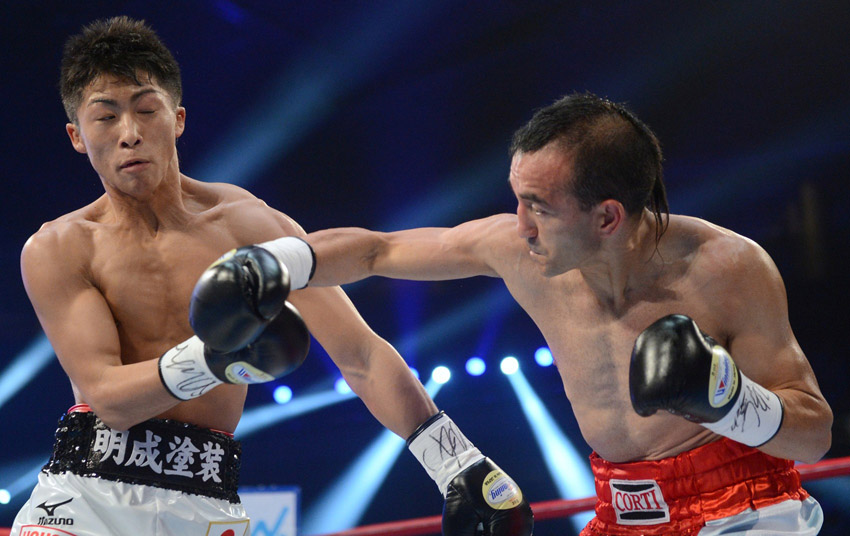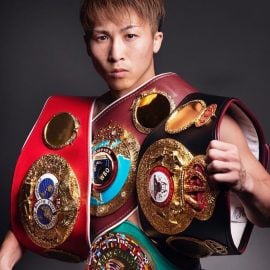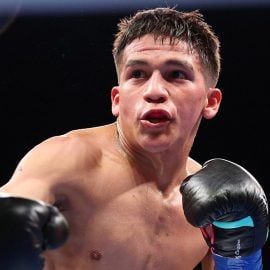Best I Faced: Omar Narvaez
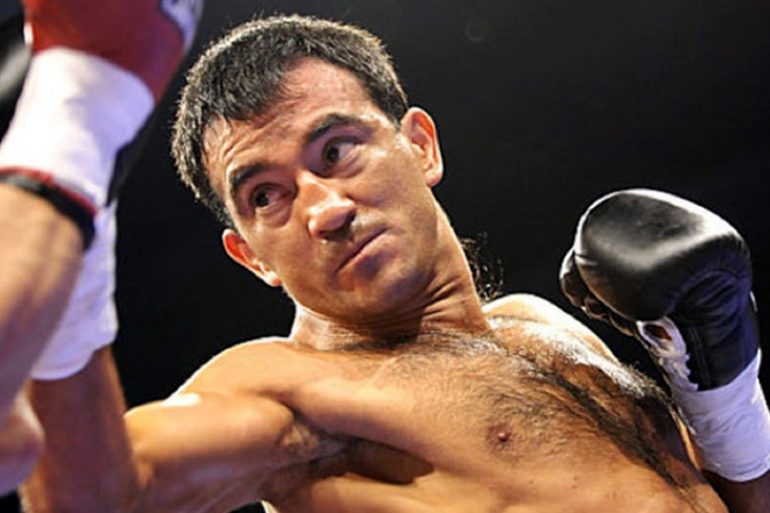
Savvy Argentinean boxer Omar Narvaez was a long-reigning world titlist at flyweight and junior bantamweight for over a decade in the early 2000s-mid 2010s.
Narvaez, who is one of five brothers, was born in Trelew, in the northeast of Patagonia, far away from the bright lights and hustle and bustle of a metropolis like Buenos Aires, on October 7, 1975.
“Growing up in the city of Trelew, we had no dangers,” Narvaez told The Ring through Fabricio Nieva. “My childhood was very beautiful. We had a very nice upbringing in a humble but very nice neighborhood. The affection of my parents was always present.”We were lucky that a plate of food was never lacking. As a child I loved playing football and I always played for clubs in my area.”
Narvaez, who only went as far as third year of high school (though he intends to go back and finish the final two years one day), didn’t follow or show interest in boxing in his early years but that changed when he reached his teen years.
“I became interested because I had an older brother who boxed and I went to see one of his training sessions, but my dream was to be a soccer player,” said Narvaez, who first took up boxing at 17. “I always played football and when I first boxed, I liked it. I got interested and changed my sport completely, and that was where my dream and goal of being a great boxer and world champion began.”
“El Huracan” caught the eye of the local scouts, and despite having just 13 amateur fights he moved to Buenos Aires to be on the national team at 20.
“Only a year-and-a-half after making my debut, the doors of the national team opened for me,” he said proudly of his swift upward trajectory. “I did not miss the opportunity. I managed to be the No. 1 in my category and the captain of the national team.”
He went on to win four national titles, though often wasn’t able to participate in many domestic tournaments because he was far better than his compatriots. He won gold at the South American games in 1998 and Pan-American Games in 1999.
On the biggest stage, Narvaez represented his country at the 1996 and 2000 Olympics, losing in the second round on each occasion. However, he was far more successful at the 1997 and 1999 World Championships, winning bronze and silver respectively.
“I lost on points in the final, in a very close fight,” said Narvaez, who lost a 6:4 decision to Bulat Jumadilov in Houston, Texas. “But hey, that was very important for me to have achieved that medal because that put me in a very good position in amateur boxing.”
Narvaez decided to turn professional, after going 78-25 in the unpaid ranks and aligned himself with promoter Osvaldo Rivero to make his debut in December 2000.
Due to his solid amateur foundation, Narvaez moved quickly, and after 18-months his team brought WBO flyweight titlist Adonis Rivas to Argentina.
“I was surprised of the opportunity, but in my mind, I was prepared because all my life I had dreamed of that moment,” he said “So, beating Adonis Rivas [by wide unanimous decision] and re-opening Luna Park in 2002 was a very nice experience and that’s where my reign as world champion started.”
The diminutive southpaw would reign for a division record 7 years and 10 months, making 16 defenses, some of them on the road in Italy, France and Spain.
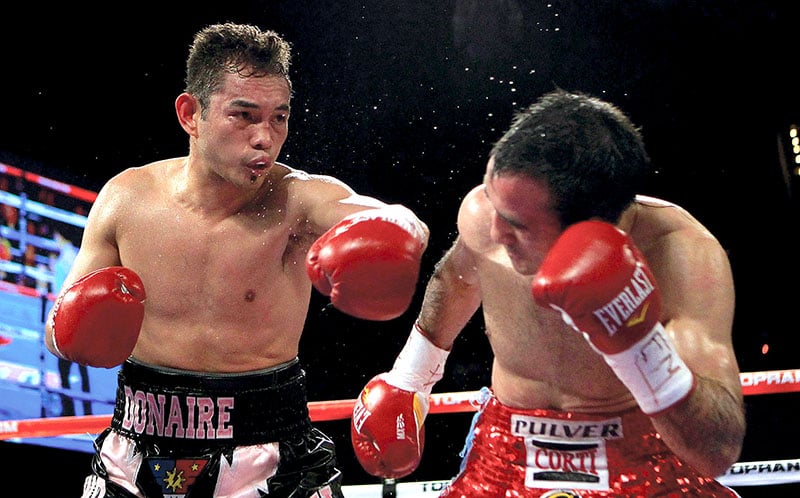
Nonito Donaire of the Philippines connects with a left to Omar Narvaez of Argentina in the WBC, WBO World Bantamweight Titles bout at Madison Square Garden on October 22, 2011 in New York City. (Photo by Chris Trotman/Getty Images)
He notably turned back the likes of Alexander Makhmutov (RTD 10), Brahim Asloum (UD 12) and Alejandro Hernandez (UD 12).
Interestingly, Narvaez vacated his title one short of equaling Pongsaklek Wonjongkam’s flyweight defense record.
”I did not know that the record was 17,” he admitted. “I never looked at that, I just wanted to be champion and the possibility of climbing to the junior bantamweight category arose [after Jorge Arce vacated.] It was difficult for me to stay in the flyweight division.”
Narvaez was matched with Everth Briceño, who he had beaten as an amateur and repeated the trick dominating the Nicaraguan to win the vacant WBO 115-pound title via 12-round unanimous decision in May 2010.
Over the next four-and-a-half-years, Narvaez made 11 successful defenses. In that period, he unsuccessfully stepped up to bantamweight and fought WBC/WBO titlist Nonito Donaire at Madison Square Garden, New York in October 2011. It proved a bridge too far.
“When I went to fight with Nonito I had a fracture in my left hand but I accepted the fight anyway – that is no excuse,” admitted Narvaez, who was shut out over 12-rounds on all three scorecards. “Boxing-wise I did not feel inferior, but I did feel inferior physically. I quickly noticed that the size difference was very difficult to neutralize.
“It perhaps became a boring fight from my part because I did not seek to push Nonito and he counter-attacked me. He tried to get me out of my boxing and I never exposed myself to his plan because my strength was always being strong defensively and counter-attack and his was also, with the difference being his reach and size, it was impossible for me to reach him. If I entered into his game plan it became just too dangerous, so I didn’t deviate from my script.”
At 115-pounds, he bested amongst others the respected Cesar Seda (UD 12) and twice edged out tough Mexican Felipe Orucuta (SD 12/ MD 12).
Narvaez was offered the opportunity to go to Japan and face burgeoning star Naoya Inoue in December 2014. It proved to be a coming out party for Inoue.
“I was aware that at some point a new star was going to appear, one that was going to uncrown me,” said Narvaez, who was stunningly stopped for the only time in his career, in two brisk rounds. “At the time I didn’t believe that that one could be Naoya Inoue because he was so young. I got surprised by the Japanese Monster.
“As everyone would notice, he had a great potential and a lot of power in his blows. I was surprised by his explosiveness, the strength of his punches. Over the years I saw what everyone have seen that he is one of the best pound-for-pound.”
Narvaez wasn’t done. He won five more fights before being matched with WBO 118-pound beltholder Zolani Tete in Belfast, Northern Ireland in April 2018.
Similar to how he was unable to create any openings against Donaire, he again fell short against his much larger opponent, dropping a shutout 12-round decision.
Narvaez boxed twice more and bowed out after losing to a journeyman in 2019. At the age of 44, he retired with nothing left to prove with a record of (49-4-2, 25 knockouts). He engaged in 32 world title fights, behind only Julio Cesar Chavez and Bernard Hopkins, and boasts an impressive 28-3-1 (13 KOs) in world title fights.
Narvaez, now 46, is married, lives in Trelew and has five children, two with his current partner. He is involved with boxing in Argentina as the coach of the national youth and junior team, imparting his experience on the next generation. He also helps his son, Junior, 16, who similarly to his father fights at 52KG and is regarded in some quarters as the best junior in the country.
He graciously took time to speak to The Ring about the best he fought in ten key categories.
BEST JAB
Zolani Tete: He had a long reach that made it impossible for me to get near and he was also southpaw, just like me.
BEST DEFENSE
Alejandro Hernandez: “Payasito” made it complicated for me because he was very defensive. He was fast with his movements and never straight ahead to fight, so it was difficult to connect a clean punch, a hard punch or a firm punch. I had to always start from the body to then get to the head.
BEST HANDSPEED
Alex Makhmutov: Makhmutov had those surprising punches, he threw very fast punches with precision. He was a veteran with lots of speed who surprised me with his punches more than once. So, I think he was one I noticed as one of the fastest.
BEST FOOTWORK
Tete: He was very tall, with long arms. He only had to move a bit and it made it uncomfortable for me to reach him. I couldn’t even connect to the body.
SMARTEST
Nonito Donaire: The most intelligent was Nonito Donaire because he always fought in his distance. It made me uncomfortable to connect with him and it also turned dangerous for me. He always tried to control me, to make me go to the body or get into his distance so he could connect. I did a couple of times and he connected with hard punches and held his cool.
STRONGEST
Cesar Seda: He was big for the category; he was throwing his body weight on me and he was firm. He was strong. I had to hit and move all the time since I was faster.
BEST PUNCHER
Naoya Inoue: I felt the power in his hands from the first moment. With the left hand you could feel great power, a great punch. He was the only one who managed to knock me down and beat me by KO.
BEST CHIN
Felipe Orucuta: He always came forward. I hit him with hard punches and could not move him. I fought him twice and both times I landed several hard punches and could never make him step back.
BEST BOXING SKILLS
Donaire: The one with the most technical resources was Nonito Donaire. A very complete boxer who had a good jab, a lot of hand speed. He worked up and down with his punches. Good footwork. He always kept the distance, the one he felt most comfortable in. I think he was the one with the most resources to face.
BEST OVERALL
Inoue: The best opponent in general I think was Naoya Inoue. He combined that explosive strength and hand speed that made him constantly dangerous. He is very complete; he knows how to box and is supported by his hand speed and power when he unloads his punches.
Fabricio Nieva helped co-ordinate and translate this feature. The Ring appreciates his assistance.
Questions and/or comments can be sent to Anson at [email protected] and you can follow him on Twitter@AnsonWainwright
